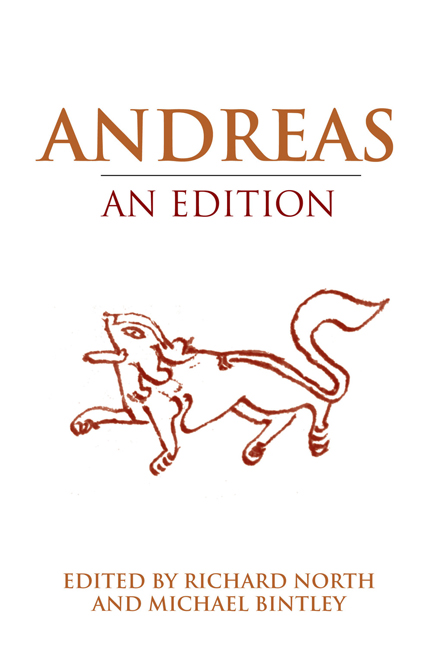Foreword
Summary
Roll over, Beethoven!
(Chuck Berry, 1956)Editions must move with the times. The last outing for Andreas, the Old English epic on St Andrew which survives at 1,722 lines, was Kenneth Brooks’ introduction, text, commentary and glossary of 1961, which gave the poem an improved text, its analogues a more rounded coverage, its metrical prosody a baptism in Kuhn's Laws and the manuscript sequel The Fates of the Apostles a new edition. Brooks was a skilful editor, but his book confirms a prejudice still with us that the poet of Andreas was maladroit and out of control, botching temporal unities and clumsily imitating Beowulf. There again, perhaps he was mocking Beowulf. Since Brooks’ time there have been some interesting developments. One is Celia Sisam's edition in 1976 of a facsimile of the Vercelli Book in which Andreas and Fates are found. Another is Donald Scragg's in 1992 of all twenty-three prose homilies in the same. A third is a growth in the understanding of West Saxon and Mercian scribal and dialectal interaction in and after the time of King Alfred. There has been the intense and not always friendly scrutiny to which Kuhn's Laws have been subjected since Bliss applied them to Beowulf in 1958, and Brooks immediately thereafter to Andreas. A fifth advance has been made in the field of Cynewulf's poetics and sources, and two more in the fields of Anglo-Saxon history and archaeology by which a burghal ideology in Andreas can now be identified. There have been yet more developments in digital palaeography and the study of the Old English language. These nine are what the present editors of Andreas will try to embody. Our final hypothesis – that the poem was composed very approximately in 890, by Æthelstan (d. 927), Mercian chaplain to King Alfred's children, a scribe of charters, king's envoy in Italy and Asia Minor and later the first bishop of Ramsbury, whence the poem was passed down through St Edith of Wilton to its copying for Archbishop Dunstan in St Augustine's, Canterbury, in c. 975 – depends for the most part on suppositions which we know that not every scholar will accept.
- Type
- Chapter
- Information
- Andreas: An Edition , pp. xiii - xivPublisher: Liverpool University PressPrint publication year: 2016

